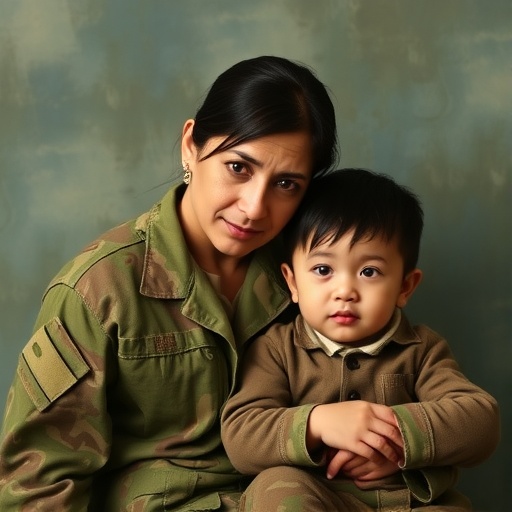In the tumultuous backdrop of war, the emotional well-being of children often hangs in the balance. A recently published study by a team of researchers from esteemed institutions highlights a vital lifeline for children navigating the choppy waters of anxiety and emotional distress during tumultuous times. The often-overlooked aspect of parental emotional support emerges as a powerful shield against the chaotic influences of conflict. As parents grapple with their own trauma, their ability to provide emotional validation and foster open dialogues about feelings has been shown to bolster children’s resilience in the face of overwhelming adversities.
The research, spearheaded by Dr. Mor Kleynikov and Prof. Dana Lassri from the Hebrew University, alongside Prof. Noga Cohen, Dr. Joy Benatov from the University of Haifa, and Prof. Reuma Gadassi-Polack from Bar-Ilan University and Yale University, underscores an intriguing yet hopeful narrative. The study, conducted in the aftermath of the October 7, 2023, terrorist attack during the ongoing Israel-Hamas conflict, delves into how parents can shield their children from the emotional fallout of war. The researchers collected data from 318 parents of children aged 5 to 18, revealing significant exposure to the war’s traumatic events.
Among those surveyed, a concerning 32% reported experiencing a rocket landing in their vicinity, while 28% tragically lost a relative as a direct consequence of the violence. Moreover, the dual burden of trauma was evident, as 28% of parents themselves met the clinical diagnostic threshold for PTSD. The researchers observed a clear correlation between the severity of parental PTSD symptoms and their children’s emotional and behavioral disturbances. Anxiety, aggression, sleep problems, and psychosomatic symptoms were significantly more pronounced in children whose parents were grappling with high levels of trauma.
However, what emerges as a beacon of hope from this research is not merely the acknowledgment of the distress caused by trauma but the establishment of a crucial buffer: Interpersonal Emotion Regulation (IER). This concept refers to the strategies parents employ to help children manage their emotions effectively. The study’s findings present a compelling case for the practice of IER, indicating that even parents experiencing severe PTSD symptoms can foster resilience in their children through adaptive emotion regulation techniques. Families who prioritized open emotional dialogues, legitimized their children’s experiences, and sought collaborative solutions reported substantially fewer difficulties among their children.
The implications of these findings resonate deeply, as they illustrate the enduring strength of familial relationships amidst external chaos. Children, even in the grips of war, can find refuge in their parent-child emotional bonds. The researchers emphasize that the protective influence of supportive parenting persists, even in instances where the parents themselves are battling trauma. This marks a significant departure from the previously held notion that only optimal parenting—free from personal distress—could safeguard children’s well-being.
The overriding message resonates with optimism: parents need not be flawless in their roles to effective protectors. What stands out is the need for parents to cultivate an environment where emotions are acknowledged and valued, establishing a safe space for children to articulate their feelings. The researchers argue for the integration of these findings into trauma-informed parenting initiatives worldwide. Accessible and evidence-based tools designed to empower parents to support their children emotionally could serve as essential interventions—not only during wartime but throughout periods of ongoing stress.
This research calls for an urgent need to develop trauma-informed parenting programs that harness the protective capabilities of familial relationships. Such programs, grounded in evidence-based strategies, can equip parents with the skills necessary to address emotional challenges, ultimately enhancing children’s well-being. Particularly in conflict zones, providing parents with practical tools to foster emotional connections with their children becomes paramount in mitigating the long-term psychological repercussions of trauma.
As this study unfolds, it posits that the heart of resilience lies within the very fabric of family dynamics. The emotional bonds shared between parents and children emerge as potentially powerful shields against the ravages of war, allowing families to withstand external threats and fostering a sense of security amidst turmoil. In an era where violence and conflict often shatter lives, the findings reflect a pressing need for communities and policymakers to prioritize mental health strategies that champion supportive parenting.
In conclusion, this vital research serves as both an urgent reminder and a hopeful call to action. It reinforces the notion that amidst the worst of human circumstances, positive parental engagement can pave the way for children to emerge resilient. By focusing on emotional connectivity and dialogue between family members, we can harness the protective potential inherent in familial relationships—creating a sturdy bulwark against the psychological impact of trauma. This study illuminates that, even in the darkest of times, glimmers of hope can flourish through the nurturing bonds of parenthood.
Subject of Research: People
Article Title: Parental PTSD and Children’s Well-Being During Wartime: The Role of Interpersonal Emotion Regulation
News Publication Date: 24-Nov-2025
Web References:
References:
Image Credits:




